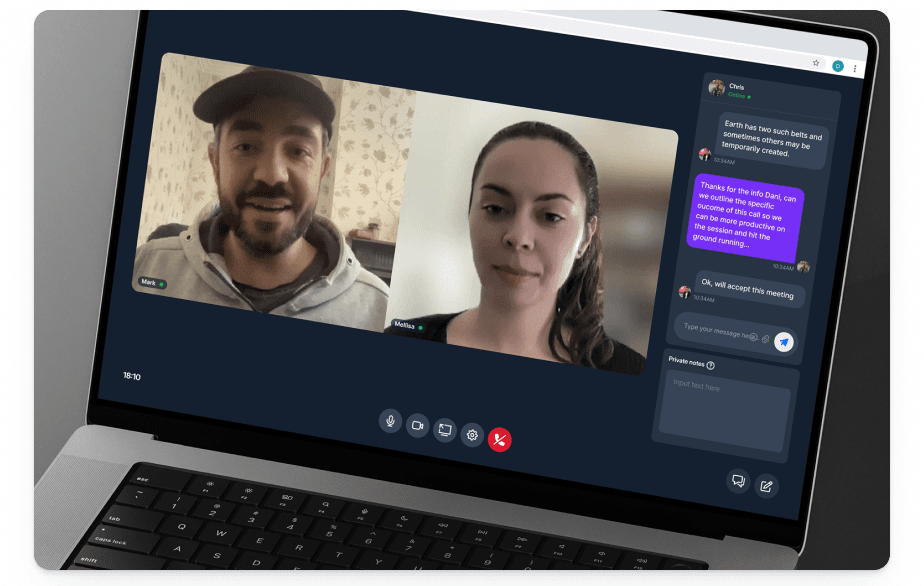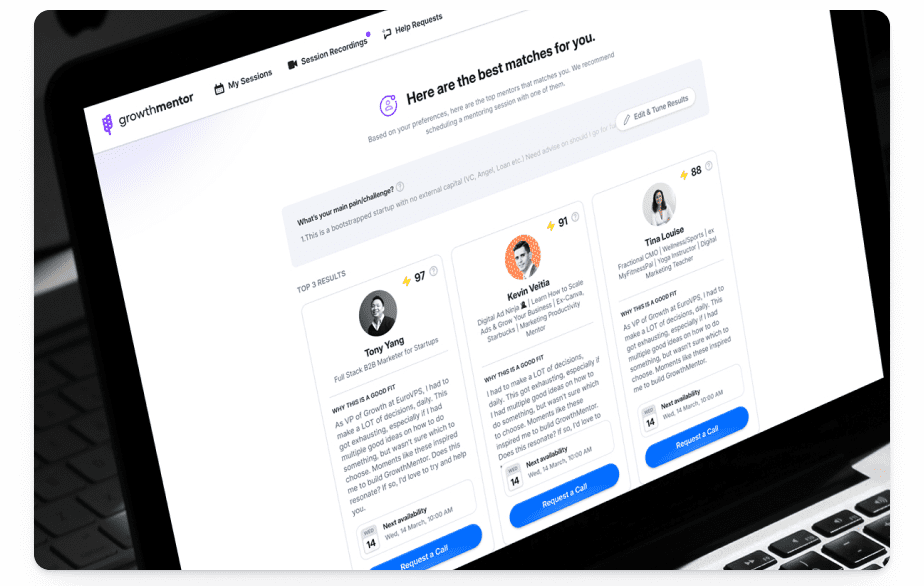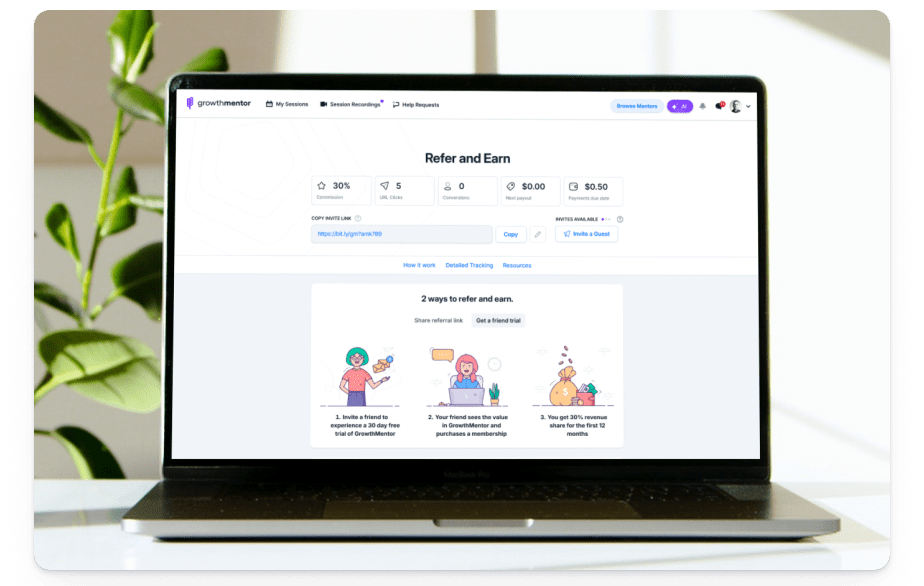“It’s insane how I’m able to hop on Zoom calls with hundreds of experts that work at some seriously impressive companies!”


Find mentors with bootstrapping experience
Connect with the right people and get unstuck
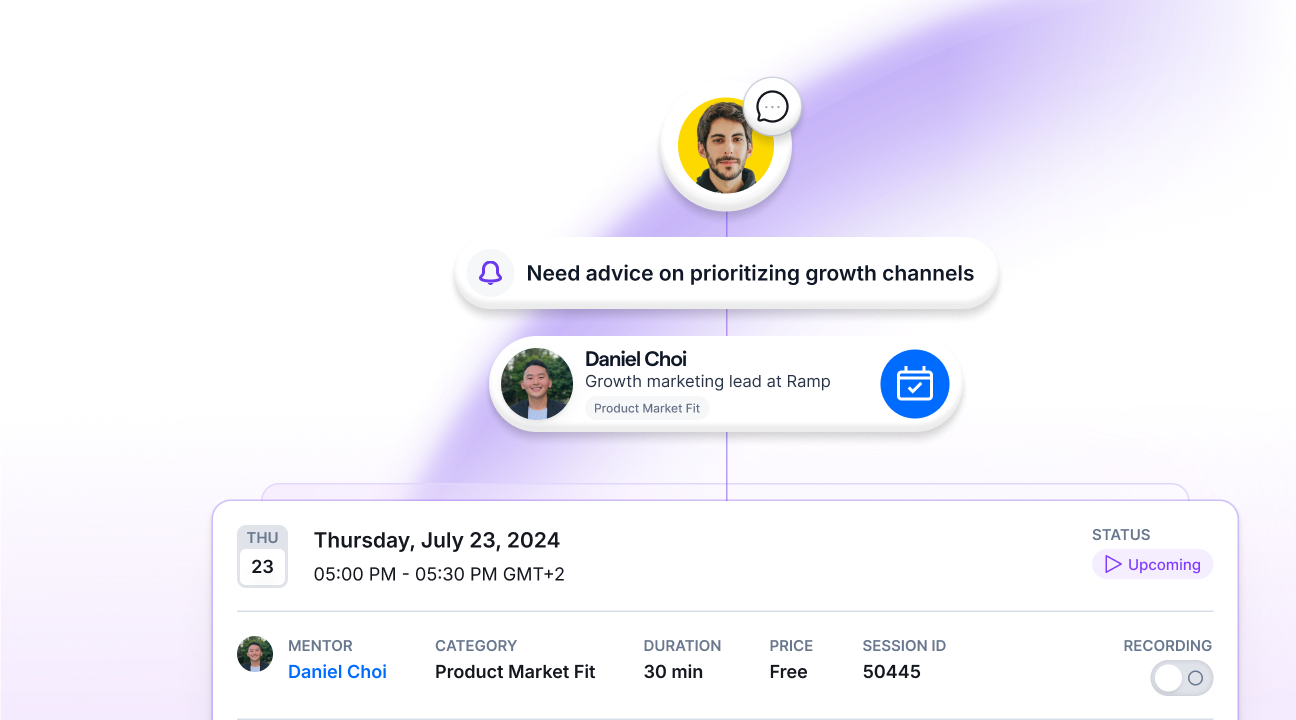

Find your mentor

Book a Call
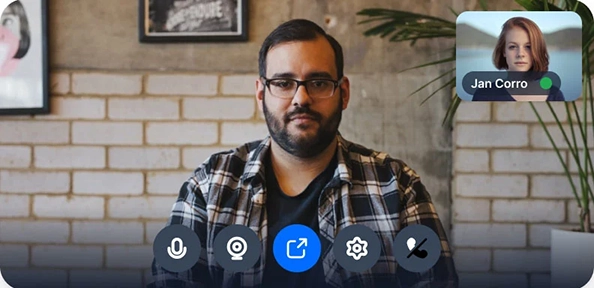
Get unstuck
Bootstrapping mentors at your fingertips
What would you like to get better at today?
Just a few of the topics being discussed over casual conversations on GrowthMentor
Book Zoom calls with vetted bootstrapping mentors and receive personalized advice that's relevant to your situation.
How to create a lean startup?
What are cost-effective marketing strategies?
How to manage cash flow effectively?
How to gain customers on a tight budget?
How can we validate our market?
How to prioritize spending?
How to maximize free resources?
What are tips for organic growth?
How to negotiate better deals?
How to set realistic financial goals?
What are budget-friendly growth hacks?
How to build a strong brand on a budget?
How to scale without external funding?
How to reduce operational costs?
All your questions about mentorship, answered
Why should I talk to a bootstrapping mentor?
Of all the strategies for starting a business, bootstrapping is one of the few that can eventually lead to huge success without a similarly huge budget.
But getting that coveted breakthrough takes a lot of grit, smart decisions, and learning from mistakes while you’re figuring things out.
Because while bootstrapping is powerful, it’s also tough. Resource limitations and unforeseen challenges are common, making it more important than ever to have practical, actionable advice.
Plus, the sheer number of decisions to be made can be overwhelming for a new entrepreneur.
Yes, there are plenty of DIY guides and success stories out there. But theory and practice are two very different beasts.
Wouldn’t you rather have confidence in every move you make?
You can. Just talk to a bootstrapping mentor.
What can a bootstrapping mentor do for me?
Most bootstrapping mentors have built and scaled multiple businesses from the ground up. Some have been successfully bootstrapping since their early days as entrepreneurs.
These mentors bring the real-world experience you need to navigate the challenges of starting and growing a business with limited resources.
With a mentor’s advice, the path to success becomes clearer. You’ll learn how to manage cash flow, prioritize spending, and make the most of what you have. They’ll help you avoid common pitfalls, identify growth opportunities, and develop a lean, efficient business model.
For more experienced entrepreneurs, a bootstrapping mentor can dive into advanced strategies like scaling operations, optimizing processes, and leveraging creative marketing tactics. They can even share examples from their own ventures so you can learn firsthand.
So you can achieve greater success with less trial and error, regardless of where you are on your entrepreneurial journey.
Should I talk to a bootstrapping mentor now?
Whether you’re just starting to bootstrap your business or already knee-deep in the process, you should talk to a bootstrapping mentor.
If you haven’t started yet, a mentor can guide you through the early stages. They’ll help you craft a solid business plan, figure out the best ways to stretch your limited resources, and provide tips on marketing and sales without breaking the bank. They can also advise you on when and how to make your first critical hires and how to build a lean, efficient operation.
If you’re already bootstrapping, a mentor can help you when:
- You’re struggling to manage cash flow and keep expenses in check
- You’re facing challenges with scaling your operations
- You’ve hit a plateau and need new strategies for growth
- You need creative solutions for marketing and customer acquisition
- You’re considering new revenue streams and want to ensure they align with your overall business strategy
Even for seasoned entrepreneurs, a mentor’s insights can accelerate your progress and help you reach new heights.
So why wait? Elevate your bootstrapping game by talking to a mentor today.
Join the most uplifting community on the internet

Frequently asked questions
Our mentors are the top 3% of their field. Every mentor goes through a strict double-vetting process to ensure they’re the best of the best.
But, when vetting, we also look at an applicant’s soft skills:
- Does this person have the patience to hop on a call with a total newbie?
- Can they hang with someone who is even more advanced than themselves in a certain area?
We’re looking for humility, kindness, and warmth.
These traits are what set Growth Mentors apart from other “gurus”.
They want to share their knowledge and help.
The short answer? Because they want to help people.
The long answer? Because…
- They enjoy sharing their knowledge
- They learn from their mentees
- They want to be a “force for good” in the business world
- They want to pay it forward
Yep. Purchase a pro plan and you get unlimited calls every month.
GrowthMentor is the only startup mentorship platform in the world where a single flat-rate subscription gets you unlimited access to hundreds of world-class mentors.
No exorbitant per-session fees, – think Netflix, but for 1:1 calls with startup mentors.
Two words: active learning. When your team goes to AI with their problems, they’re often consuming the information, but not applying it.
By talking things through with a mentor, your team members will sharpen their understanding of their challenges and find routes to put the advice into action faster than they could with an AI solution.
Yes. If it’s not for you, simply cancel your membership within 14 days and contact support for a full refund.
Note that refunds are not possible if you’ve breached our terms of service.











